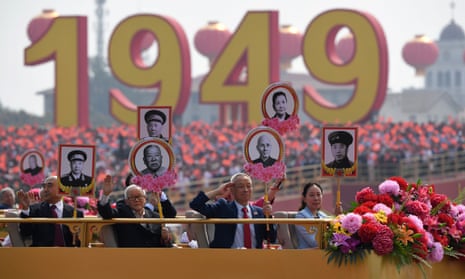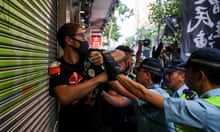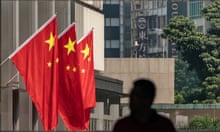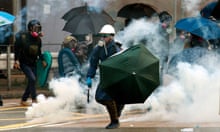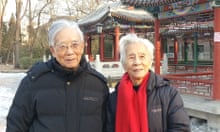China has celebrated 70 years of Communist party rule and its rise to global superpower status with a military parade showcasing the country’s technology, and a promise from President Xi Jinping that “no force can shake the status of this great nation”.
But huge and violent protests in Hong Kong cast a long shadow over Beijing’s carefully-choreographed projection of national unity and power.
China’s leadership past and present gathered on a viewing platform over Tiananmen Square on Tuesday to watch the military parade of 15,000 troops and weapons including new hypersonic drones and intercontinental ballistic missiles.
It was followed by a civilian parade, featuring tributes to national icons from founding leader Mao Zedong and the bicycles China was known for before it became an economic juggernaut, to the cities that have sprung up since the reforms of the 1980s.
Xi, who has spent years consolidating his grip on power to become perhaps the most influential leader since Mao himself, launched the celebrations with a speech that underlined China’s economic rise and the party’s role in fostering it.
“There is no force that can shake the status of this great nation. No force can stop the Chinese people and the Chinese nation forging ahead,” he said. Hewing to tradition, he wore a grey Mao suit and watched the parade from the same spot where Mao stood to announce the establishment of the People’s Republic of China on October 1, 1949.
Then China was so poor and battered by civil war that some of its 17 war planes were reportedly ordered to fly by twice, to make the airforce seem larger than it was. This year’s vast parade emphasised how much has changed.
It began with helicopters flying overhead carrying the communist party, state and military flags; the order offering a further hint at the Chinese leadership’s priorities.
For the party, this is one of the most consequential national day celebrations. The state it controls has now outlived the Soviet Union that was once its sponsor and supporter; Chinese officials for years have studied the collapse of the USSR in a bid to avoid a similar fate for the PRC.

But the anniversary also comes as Beijing faces its most serious challenges since the 40th national day in 1989. That fell months after the military killed pro-democracy protesters in and around Tiananmen, plunging China into international isolation.
Today a trade war with the US threatens both the American and Chinese economies, there is growing international unease at Xi’s aggressive projection of power beyond China’s borders, and domestic problems belie attempts to unite China’s 1.4 billion people around the president’s vision of a “Chinese Dream”.
In addition to unrest in Hong Kong, and growing support for anti-Beijing politicians in Taiwan – the self-ruled island claimed by China – there is rising international concern about the detention of over a million people in far western Xinjiang region.
TimelinePeople's Republic of China at 70
Show
After more than 20 years of civil war, Mao Zedong leads the communists to victory over the nationalists, and proclaims the founding of the People's Republic of China on 1 October.
China launches a five-year economic plan, the "Great Leap Forward", collectivising farming and investing in heavy industry. The plan is abandoned after two years after poor harvests lead to starvation and millions of deaths.
The 10-year "Cultural Revolution" causes economic and political upheaval, as Mao attempts to purge communist China of remaining capitalist and traditional elements of society, and enforce Maoism as the dominant and permanent ideology.
Chairman Mao dies.
China's "one-child policy" is introduced to curb population growth.
Troops fire on protesters in Tianaman Square who had been campaigning for greater freedom and democracy. The uprising is crushed.
The opening of the Shanghai and Shenzhen stock exchanges symbolise the increasing economic liberalisation of China.
Control of Hong Kong is handed back to China from the UK. Two years later Portugal transfers the sovereignty of Macau back to the Chinese.
China joins the World Trade Organization.
Yang Liwei becomes the first Chinese astronaut. Within 10 years the country will successfully deploy a robot rover on the moon.
After years of tension, including riots over how Japanese schoolbooks are accused of portraying the events of the second world war, and tensions over territorial claims in the South China Sea, Wen Jiabao becomes the first Chinese prime minister to address Japan's parliament.
Beijing hosts the Summer Olympic and Paralympic Games.
China overtakes Germany as the world's biggest exporter of goods. The following year it becomes the world's second-largest economy, over-taking Japan.
The Chinese economic "miracle" falters, as growth falls to its lowest level for 25 years.
China becomes increasingly embroiled in a trade war with the US.
A series of major pro-democracy protests in Hong Kong challenge Chinese rule there. The country's human rights record also comes under scrutiny for its treatment of the Uighurs, with claims that more than 1 million of them have been detained in camps the Chinese have euphemistically called “vocational education centres”.
Xi in his speech promised to “maintain the long-term prosperity and stability” of Hong Kong and said the government was committed to the political template which gives the city limited autonomy, ‘one country, two systems’.
But months of protests in the city have shown widespread opposition to his vision for China, of economic prosperity without political freedoms.
Activist Joshua Wong called on Twitter for international support for Hong Kong protestors. “No celebration, only demonstration”, he said, warning that China was using Hong Kong to “wave its claws at the free world to step up its oppression”.
In Beijing authorities had left nothing to chance in their meticulous planning for the biggest national celebration since Xi came to power.
The capital was put on lockdown, with bans on everything from kites and homing pigeons to drones, and people who live along the parade route asked to leave their homes ahead of national day.
To prevent anything marring the special day, there has also been a fierce crackdown among those who criticise the government.
Normally outspoken activists and critics have been ordered not to speak to foreign media. Some, who have expressed support for the Hong Kong protests, have had to promise they won’t travel to the city until well after the anniversary.
In Hong Kong, official celebrations were muted, including a morning flag raising ceremony closed to the public.
Chief executive Carrie Lam was in Beijing, one of the very few senior women watching the parade from the VIP platform overlooking Tiananmen square.
Larger protests linked to the city’s nearly four-month old movement began in the afternoon, even though they were denied an official police permit. Amid scenes of mayhem a protester was hit in the chest with live ammunition.
